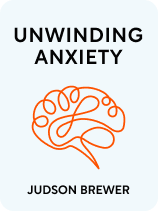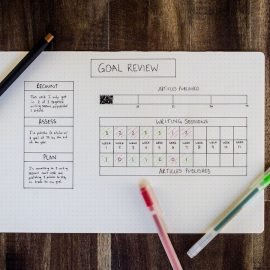

This article is an excerpt from the Shortform book guide to "Unwinding Anxiety" by Judson Brewer. Shortform has the world's best summaries and analyses of books you should be reading.
Like this article? Sign up for a free trial here.
What is a mindfulness practice? Do you want to live a stress-free life?
You can’t solve a problem you haven’t noticed yet, so the first step to treating anxiety is to recognize the behavioral and thinking loops that create and result from anxiety. To do so, you need to practice mindfulness so that you’re more aware of your thoughts and actions.
Below is Dr. Judson Brewer’s explanation of mindfulness, as written in his book Unwinding Anxiety.
What Mindfulness Is
What is mindfulness practice? Brewer borrows his definition of mindfulness from mindfulness proponent Jon Kabat-Zinn, who says that mindfulness means: “Paying attention, on purpose, in the present moment, non-judgementally” [sic]. Brewer distills this definition down to two components: awareness and curiosity.
Awareness means recognizing what you’re doing as you’re doing it. Anxiety and its related behaviors easily become automatic, but awareness allows us to notice when we’re switching into autopilot. Physiologically, our brains have a system called a default mode network that takes over when our minds wander or when we’re caught in common thought patterns (such as anxious worry about the future or depressive rumination about the past). Brain scans show that mindfulness quiets the default mode network—in other words, it deconstructs the thinking loops that create anxiety and depression in the first place.
Curiosity means looking deeper into what exactly you’re doing, why you’re doing it, and what you’re getting out of it (in other words, noticing the trigger, behavior, and result). Brewer says that curiosity also means looking at your thoughts and behaviors with gentle interest rather than judgment or criticism. This distinction is important because mindfulness involves observing objectively—which you can’t do if you’re berating yourself for your thoughts and actions. Brewer says there’s a common misconception that mindfulness involves clearing your mind or getting rid of thoughts—but that’s not actually possible, nor is it the goal of mindfulness. In fact, being mindful includes noticing your thoughts without trying to control or change them.
Mindfulness in Action
Brewer explains mindfulness in general terms, and while he gives many examples of awareness and curiosity in practice, these examples are spread throughout the book in service of various related arguments. Because mindfulness is the core principle of Brewer’s approach to anxiety, it’s worth pausing here to look at an extended example of how it helps you recognize and break down your anxious patterns.
First, mindfulness helps you notice anxiety as soon as it arises. Say you wake up in the morning feeling anxious. Without mindfulness, you might not realize why you feel that way and you might even beat yourself up for being in a bad mood. With mindfulness, you might notice the anxious feeling and realize that you feel stressed because you have to pay bills today.
Second, mindfulness helps you interrupt anxious thoughts. When you remember the bills, you might start worrying—Do I have enough money to pay them? Did I already miss a due date? Without mindfulness, you might not even notice these thoughts—you might just feel your stress increasing without knowing why. With mindfulness, you might notice these thoughts and realize that they aren’t actually helping you.
Third, mindfulness helps you focus on action rather than worrying. Without mindfulness, you might sit down to pay the bills only to find yourself browsing social media 30 minutes later without knowing how you got there. With mindfulness, you might notice the initial impulse to check your feeds, or you might realize what you’re doing after only a few minutes of checking posts. Plus, instead of beating yourself up for being lazy, you might notice that the impulse to check social media is actually a manifestation of the anxiety you feel about paying bills.

———End of Preview———
Like what you just read? Read the rest of the world's best book summary and analysis of Judson Brewer's "Unwinding Anxiety" at Shortform.
Here's what you'll find in our full Unwinding Anxiety summary:
- How to recognize and counteract anxiety with mindfulness
- Why anxiety becomes is toxic if left untreated
- A three-step method for treating anxiety






